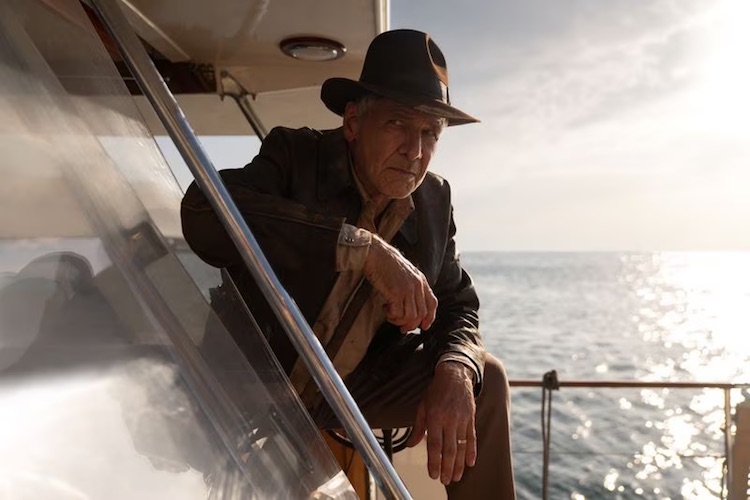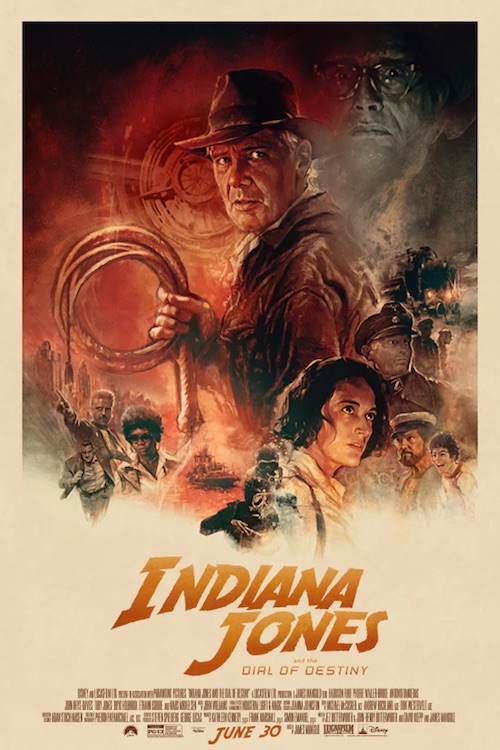Harrison Ford returns as Indiana Jones for his (presumably) final big screen adventure as the titular character in Indiana Jones and the Dial of Destiny. While this fifth installment in the series is an improvement over 2008’s Indiana Jones and the Kingdom of the Crystal Skull, it fails to reach the heights that the first three films in the series – Raiders of the Lost Ark (1981), Indiana Jones and the Temple of Doom (1984), and Indiana Jones and the Last Crusade (1989) – managed to achieve.
In this adventure, an aged Indiana Jones (Ford) finds himself in the 1960s where he must race against time itself to keep the legendary Dial of Destiny out of the hands of former Nazi Jürgen Voller (Mads Mikkelsen) who plans to use the device to change the course of history.
Of course, Dr. Jones does not take on this task alone. This time around he is accompanied by his goddaughter Helena (Phoebe Waller-Bridge) and her partner in crime Teddy (Ethann Isidore), as they try to stay one step ahead of Voller and find the Dial themselves. Also lending a hand this go around is Indy’s old friend Sallah (John Rhys-Davies) as well as new allies to the fold in Renaldo (Antonio Banderas) and Basil Shaw (Toby Jones).
In taking over directorial duties from Steven Spielberg (who helmed all four of the previous films), director James Mangold (Ford v Ferrari [2019]) does an admirable job of recreating the adventure and drama of the earlier films while forgoing the whimsy and silliness that besot Kingdom of the Crystal Skull. However, one often feels that the film is a testament to its predecessors and not a work of its own. The film still somehow manages to move along at an entertaining pace despite sporting the longest running time of the series at two hours and thirty-four minutes.
Penned by no less than four screenwriters – including Jez Butterworth (Ford v Ferrari and Edge of Tomorrow [2014]), John-Henry Butterworth (Edge of Tomorrow), David Koepp (Jurassic Park [1993]), and director Mangold – the script moves the plot along economically enough without losing its way on too many tangential detours.

Indiana Jones in “Indiana Jones and the Dial of Destiny.” © 2022 Lucasfilm Ltd. & TM. All Rights Reserved.Jonathan Olley / Lucasfilm Ltd.
The cinematography courtesy of Phedon Papamichael manages to retain the feel of the series while simultaneously bringing it into the Sixties. Similarly, John Williams’ score brings back the epic feel of previous installments whilst still delivering a few nuanced nods to the cinema of the times.
While none of the subsequent films in the series will ever enjoy the same level of love and admiration as the first – which is, of course, now rebranded Indiana Jones and the Raiders of the Lost Ark – this latest installment manages to recapture a little of the spirit of the first three films and serve as a more fitting sendoff for the now legendary character.

| Producer: | Kathleen Kennedy, Frank Marshall, Simon Emanuel |
| Release Date: | June 30, 2023 |
| Running Time: | 144 minutes |
| Starring: | Harrison Ford, Phoebe Waller-Bridge, Antonio Banderas, John Rhys-Davies, Shaunette Renée Wilson, Thomas Kretschmann, Toby Jones, Boyd Holbrook, Olivier Richters, Ethann Isidore, Mads Mikkelsen, Martin McDougall, Alaa Safi |
| User Rating: | |
| Writer: | Jez Butterworth, John-Henry Butterworth, David Koepp, James Mangold |
| MPAA Rating: | PG-13 (for sequences of violence and action, language and smoking) |
| Director: | James Mangold |
| Distributor: | Walt Disney Pictures |
| External Info: | Official Site / Facebook / Instagram / Twitter / #IndianaJones |

